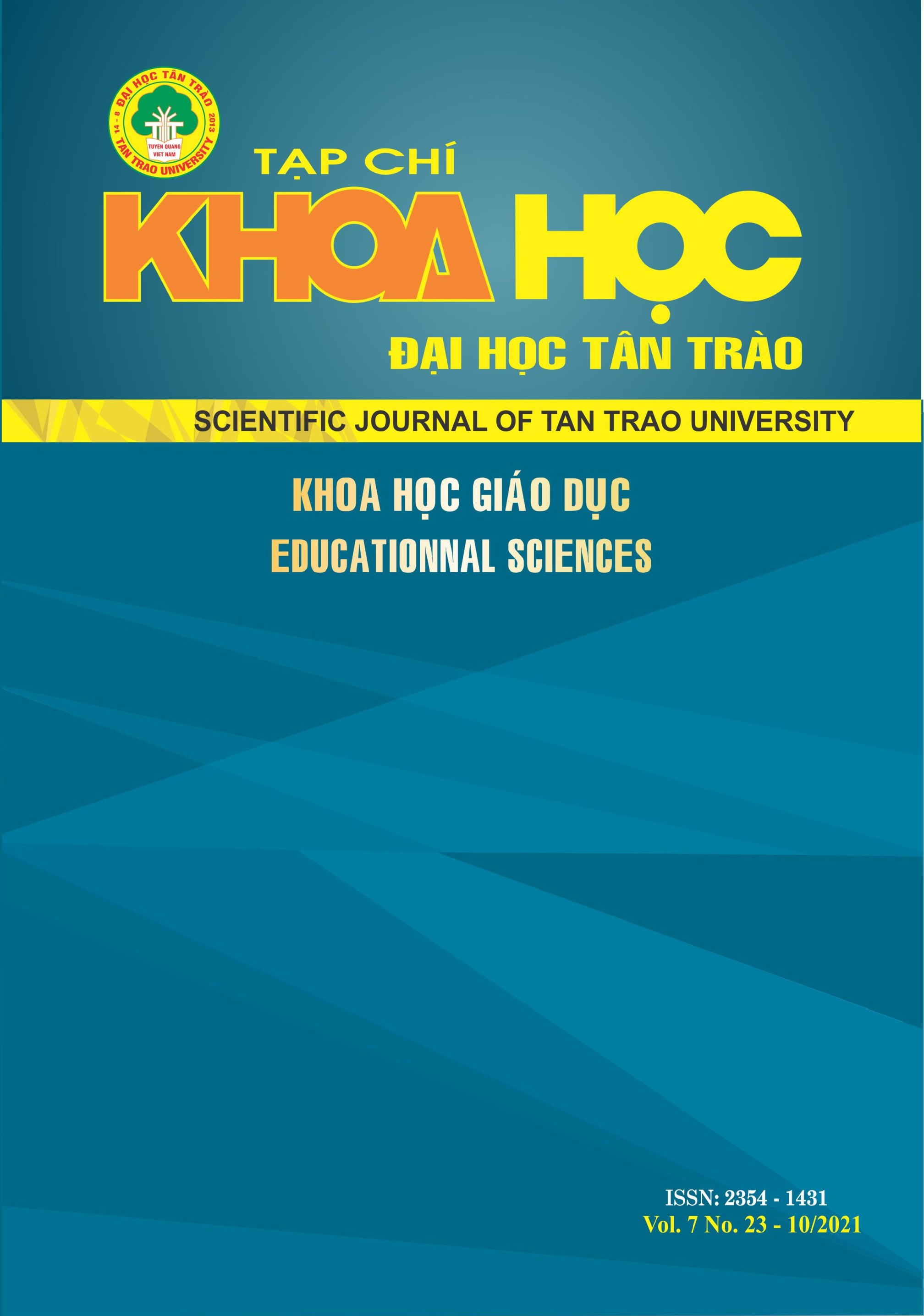TRIỂN KHAI CÁC TRÒ CHƠI NHẰM NÂNG CAO VỐN TỪ VỰNG CHO SINH VIÊN TRƯỜNG ĐẠI HỌC CÔNG LẬP
DOI:
https://doi.org/10.51453/2354-1431/2021/491Từ khóa:
Trò chÆ¡i, từ vá»±ng, dạy tiếng anhTóm tắt
Trong những năm gần đây, dạy tiếng Anh đã trở thành môn học bắt buộc tại các trường phổ thông, cao đẳng và đại học. Đó là lý do tại sao dạy và học tiếng Anh hiệu quả đóng vai trò quan trọng trong sự phát triển của hệ thống giáo dục. Tuy nhiên, học sinh còn yếu về kỹ năng giao tiếp do thiếu kiến thức từ vựng tiếng Anh. Mục đích của bài báo này là tìm kiếm bằng chứng để chứng minh rằng việc dạy trò chơi rất hữu ích trong lớp học ngôn ngữ vì phương pháp này giúp cải thiện và tăng vốn từ vựng của học sinh. Kết quả cho thấy các trò chơi ngôn ngữ không chỉ nâng cao kiến thức từ vựng cho học sinh mà còn khiến bài học trở nên thú vị hơn, học sinh có động lực học tiếng Anh và có nhiều tương tác với giáo viên và bạn học. Nghiên cứu gợi ý rằng trước khi sử dụng trò chơi trong lớp học ngôn ngữ, giáo viên nên chọn tài liệu, cấp độ, bối cảnh, chủ đề, thời gian dành cho trò chơi phù hợp.
Tải xuống
Tài liệu tham khảo
[1] Bakhsh, S. G. A. (2017). Using games as a tool in teaching vocabulary to young. Learners English Language Teaching, 9 (7): 120-128.
[2] Chancons, R .(2010). Insight into non- native vocabulary teaching and learning, p.28-83 MPG books group ltd .Great Britain.
[3] Carter, R. (1998). Applied linguistic perspectives, London: Routledge
[4] Ernawati, J. (2009). Improving elementary school students’ vocabulary mastery through language games (Unpublished master thesis). Sebelas Maret University. Indonesia.
[5] Guo, Y. (2008) .The role of vocabulary knowledge, syntactic awareness and metacognitive, p.3. Ann Arbor United State.
[6] Hedge, C .J. H., Ferris, D., R. (2009). Teaching readers of English: Students text and contexts, p.296. Routladge New York
[7] Hoang, T. T. (2000). The practice of English language teaching, Malaysia: Longman
[8] Huckin, T., Coady, J (1997). Second language vocabulary acquisition: A rational for pedagogy, pp .23 .31.Cambridge university press.
[9] Huyen, N. T. T., Nga T. T. K. ( 2003). Learning vocabulary through games. Asian EFL Journal, 5(4): 58-73.
[10] James, F.et.al. (2012). Vocabulary instructions second edition: Research to Practice: Guilford press.
[11] Maria, N. P. (2017). Using games to improve vocabulary knowledge of the 11th grade students of senior high school (Unpublished master thesis). University Yogyagkarta, Indonesia.
[12] LIach, M. P. (2011). Lexical errors and accuracy in foreign language writing, p.38 Mbc book group Great Britain.
[13] Lo'pez, M. D.(2010) .The treatment of lexical aspect in commercial textbooks for L2 teaching and learning in Chacon ,R et ,al Insight into non native vocabulary teaching and learning ,p.156- 161 MBG group Great Britain.
[14] Nation, P., Hirsh, D. (1992) .''What vocabulary size is needed to read unsimplified text for pleasure''. In Reading in foreign language , 8. (2): 689 -695.
Nation, ISP (1994) . New ways in teaching vocabulary. P. V Alexandria, V.
[15] Nation, P., Waring, R. (1997). Vocabulary size, text coverage and word lists in Schimtt, N. and Mc Carty, M. (2010). Vocabulary: description, acquisition and pedagogy, Cambridge University press, 8 - 10.
[16] Nation, I. S. P. (2001). Learning vocabulary in other in other language: Cambridge university press.
[17] Schmitt ,N., Jiang , X. (2011) The relation between percentage of vocabulary knowledge and level o comprehension, The modern language journal , 95(1): 26-23
Tải xuống
Đã Xuất bản
Cách trích dẫn
Số
Chuyên mục
Giấy phép

Tác phẩm này được cấp phép theo Giấy phép Quốc tế Creative Commons Attribution-ShareAlike 4.0 .
Bài báo được xuất bản ở Tạp chí Khoa học Đại học Tân Trào được cấp phép theo giấy phép Ghi công - Chia sẻ tương tự 4.0 Quốc tế (CC BY-SA). Theo đó, các tác giả khác có thể sao chép, chuyển đổi hay phân phối lại các bài báo này với mục đích hợp pháp trên mọi phương tiện, với điều kiện họ trích dẫn tác giả, Tạp chí Khoa học Đại học Tân Trào và đường link đến bản quyền; nêu rõ các thay đổi đã thực hiện và các nghiên cứu đăng lại được tiến hành theo cùng một bản quyền.
Bản quyền bài báo thuộc về các tác giả, không hạn chế số lượng. Tạp chí Khoa học Tân Trào được cấp giấy phép không độc quyền để xuất bản bài báo với tư cách nhà xuất bản nguồn, kèm theo quyền thương mại để in các bài báo cung cấp cho các thư viện và cá nhân.
Mặc dù các điều khoản của giấy phép CC BY-SA không dành cho các tác giả (với tư cách là người giữ bản quyền của bài báo, họ không bị hạn chế về quyền hạn), khi gửi bài tới Tạp chí Khoa học Đại học Tân Trào, tác giả cần đáp ứng quyền của độc giả, và cần cấp quyền cho bên thứ 3 sử dụng bài báo của họ trong phạm vi của giấy phép.


